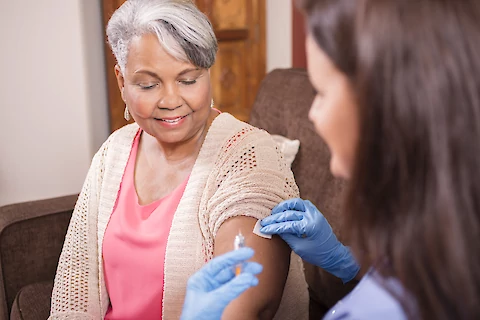
As winter rolls in, so do a variety of health concerns, particularly for our senior population. Among these is the Respiratory Syncytial Virus (RSV), a common yet potentially severe illness for senior adults. Read on to learn more about RSV, understand why elderly people are more susceptible, and unearth practical advice for preventive measures.
Understanding RSV
Respiratory Syncytial Virus (RSV) is a highly contagious virus that causes respiratory infections. It spreads primarily through droplets in the air when an infected individual coughs or sneezes. RSV also survives on surfaces, meaning it can be contracted by touching contaminated items and then touching the face. While RSV often only causes mild, cold-like symptoms in most people, it can be significantly more severe in seniors.
What Is the Risk of RSV for Seniors?
For the elderly population, RSV poses a serious threat due to declining immunity with age and potential pre-existing health conditions. Senior adults are more susceptible to developing serious complications such as pneumonia, bronchitis, and, in severe cases, respiratory failure. Such complications can be life-threatening, emphasizing the need for preventive measures and the ability to recognize early signs of infection.
Protecting Seniors From RSV
As a caregiver, your role in protecting seniors from Respiratory Syncytial Virus is paramount. One of the most effective defenses is practicing good hygiene. Regular handwashing, avoiding touching your face, and disinfecting common surfaces can limit the spread of the virus. Furthermore, limiting close contact with individuals who show signs of respiratory infections can also help protect seniors from exposure.
While RSV vaccinations mainly target infants and young children, research is ongoing to develop an effective vaccine for senior adults. Until then, the annual flu shot and pneumonia vaccine may provide some added protection, as they help improve overall respiratory health.
When to Seek Medical Attention
Knowing when to seek medical attention is crucial. Symptoms of Respiratory Syncytial Virus in seniors may include:
- Coughing
- Wheezing
- Shortness of breath
- Fever
- Fatigue
If a senior shows signs of confusion, bluish skin coloration, or difficulty breathing, immediately seek medical help. These could be signs of a severe RSV complication.
How Senior Helpers Princeton Can Help
Senior Helpers Princeton can play a significant role in safeguarding the health of your loved ones. Our trained professionals provide personalized care that caters to seniors' everyday needs and focuses on creating a safe and healthy living environment. This includes ensuring cleanliness, encouraging good personal hygiene, and closely monitoring seniors' health, which is essential in preventing the spread of infections like RSV.
Respiratory Syncytial Virus may pose a significant risk to our seniors, especially during winter, but knowledge and proactive measures can make a difference. For residents in Princeton, Plainsboro, Pennington, and surrounding areas, consider Senior Helpers Princeton. Let us support you in creating a safer, healthier home for your senior loved ones, where they can thrive even in the harshest winter months. Contact us today for more information on our services.